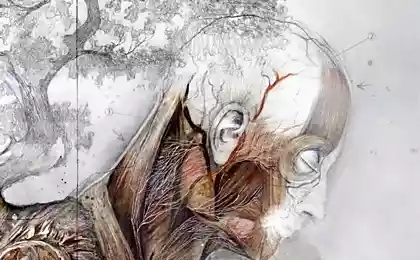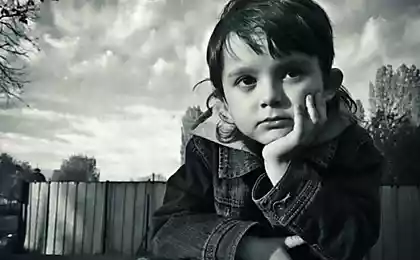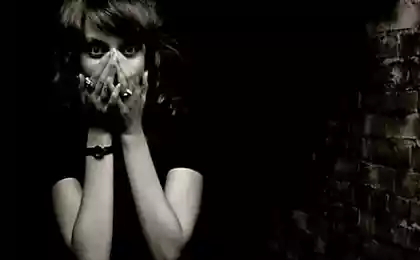552
Emotional extortion
Resentment. One of the most understandable emotions. We all somehow offended in this life, and yet each of us has offended someone. A lot of lives warped by resentment, a lot of broken relationships, wrecked lives. Probably everyone would like to rewrite many of the pages in my life and erase her pain. Many people with this purpose come on reception to the therapist and ask — spend a session of hypnosis, I didn't remember what had happened.
However, amnesia is not a panacea. It is much better to understand the origins, the roots of this feeling, to understand how to live it and be free from emotional baggage. That's exactly what we're gonna do. Resentment is a condition inherent to children's age, this is where it begins, and then accompanies us through life. However, resentment is a normal human emotion. In daily life this feeling is caused when events occur, unplanned by us, something unpleasant happens to us. Suddenly life goes not on that route, the plan, as we would like. We don't know how to deal with it, not ready to such turn of events, I want to defend myself from the situation, the circumstances, and as protective reaction a sense of resentment.
So, resentment is a natural reaction that periodically we live. Ie even in our spiritual practice, it is impossible to fully get rid of this feeling, another issue is that we can learn to control it, but deep down, sometimes we will be hurt, wounded. Otherwise, we should become emotionless robots.
However, there is another concept — the resentment, that is, a chronic state of resentment. What exactly you should be free, so it's resentment as the quality of the character. Resentment is a mental concept more, it is a state of mind. And this is the diagnosis, this is cause for concern.
Psychologists say that resentment is a manifestation of the child EGO-state. That is outside us can be 30 or 60, but inside we can feel like 5-year-old scared child or rebellious teen Says that each of us lives a child, regardless of our age. And this baby or happy or lonely inside of us. Sometimes he takes the decision for us, gives emotional outbursts, unpredictable behavior, and that he is able to learn easily find the most incredible creative solutions. The child in us will always continue to live, and the more it will be interesting in this world, so it will be interesting to us. Never we your inner child don't kill, thank God. We need to create comfortable conditions for its development.
But in addition to the child's inner influencing us subconsciously, must be at the level of consciousness of a Mature person who actually controls the life. Since the Mature personality after some moments, when there was a fogging of the mind emotions, to continue the conversation. A Mature personality in adulthood might say, "Excuse me, your words were for me, painful. I don't think you wanted to hurt me?!" Seemingly simple phrase.
Please tell me if you here this phrase spoken, even if you had malicious intent to hurt, what emotions does it cause? Even if we assume that you are such a demonic creature, your goal is to offend people. In life, these individuals practically do not exist. Often we offend accidentally, subconsciously, not putting before itself the purpose to offend. But if you hear such words invariably come remorse and shame. This is natural, because they think: "Oh, my God, of course not. I'm sorry, I didn't mean to offend. You do not understand me. I would like you to explain". And then you by clarifying the situation, I can understand, no offense. This is the function of an adult, it is the function of the mind. At this resolution the situation we really want to hear person.
Unfortunately, in most cases, we don't want to hear each other, we want to hear only himself and the view that somehow coincides with our. But if we want to respect the person, we are obliged to clarify the situation, even if his words cause us pain. I refer to his desire to clarify the situation — is a feature of a Mature man.
It is very important to learn to identify their feelings. And to learn this is to model "I-messages". Often we say "you-messages". We say, "You're annoying, you disturb me, you do anyway". I.e., we always start his speech with pronouns "You" and almost never say "I".
What do you mean — "I-message"? When I talk about my feelings and about his wish, starting with the pronoun "I". For example, I said, "I feel pain" or "I'm feeling as I boil wave of irritation," or "I feel now that I fear comes, I have distrust." I give a report of what I feel at this point in time. It is important to understand that we always feel something.
Another issue is that we are not taught this. At the seminar "Window to the world of the child", where I teach parents conscious parenting, I always ask parents to indicate the feelings of the child in his emotional reactions, thus we help our child to get acquainted with the world of emotions and feelings. I say that in the period when the child is small, he doesn't understand what's going on with him, he needs to tell. He needs to identify his feelings and emotions.
For example, a child stamping her feet, and we say — I see you are angry, you are not satisfied with something. I.e., we denote this, and the child understands that mom is not afraid of his behavior, the mother is not annoying. Often in life, the parents yell at the child: "hush, this moment! Otherwise the angle will put..." i.e. start to get annoyed, while completely ignoring the emotion of the child. And the child then grips your emotions. But since he is a living being, he continues to experience them. He starts to experience very strange way.
There are 4 basic emotions that a person experiences:
1. Sadness.
2. Joy.
3. Fear.
4. Anger.
I ask you to think about which of these emotions you were BANNED? Now we are going to talk about it. And we will see that we banned a natural manifestation of our feelings and emotions, the result is.
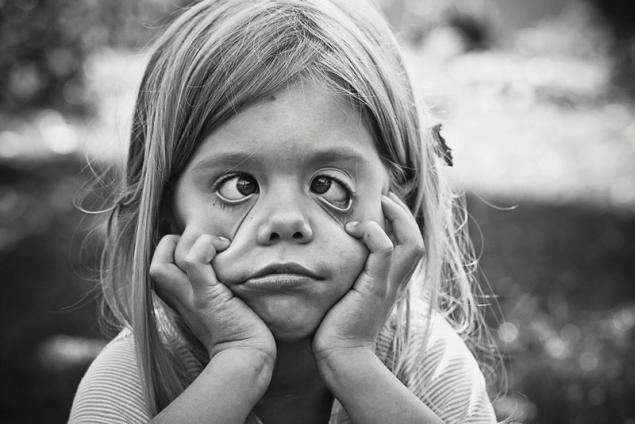
SADNESS.
Whom was forbidden the expression of sorrow in childhood? Ie when you were sad, you said, "What are you doing that face, come on, come on!" You are not allowed to be in a sad mood. Or somehow distracted, or entertained, or doing something, but the sadness was forbidden.
It is interesting that instead of forbidden emotions, comes some other emotion, the so-called racketeering in emotion. Heard the racket? So there is an emotional racket. I begin to use a different emotion, which is acceptable, which in our family is welcome.
I can say that this story is about me. We in the house were forbidden sadness. The alternative it was joy. That is, if the person has been sad in our family, it was not welcomed. Welcome joy, and this is manifested in the following way. There is a scenario of life, is called "bring joy to others."
Ie people who live in such a scenario, any company begin immediately to jest, to joke, to cheer everyone. As soon as the company, they begin to work kultmassovym entertainers. I must say that this is a great ability, but bad when you do it virtually without a choice. It is your coercive behavior, your coercive behavior to have all. You just can't allow someone sad sat. Be sure you have a sad laugh.
Among us there are people who, because of their profession are "Joker", like Mikhail Zhvanetsky. If you ask their families what they are in the home, usually they are very prone to depression. But as soon as they see the spectator as soon as I see the side view, begin to portray.
The look they remember from childhood, this look of their mom or dad. And so now, any opinion, addressed to you, it is an occasion for the manifestation of artistic abilities. For others this person is very attractive, the soul of the company. He is asked everywhere, he's funny. But still one problem, who would amuse him. Because he's really not rosy, even when she smiles.
I had one girl in respiratory therapy. Therapy deep breathing is used to cleanse the subconscious. You breathe deeply, focus on the breath, not controlling the situation, it sounds special music. Girl crying during therapy, but along with the tears she had stretched widely in a smile face. It was a grimace of laughter. This condition was the man. Surrounding will never believe that funny can be a problem.
ANGER.
If you were banned anger, often to be replaced as the racket comes fear. Such people are often quiet, taciturn, prefer to be outside, I do not like to open, etc? They are actually afraid. Because at a deep enough contact they begin to feel like "something" rising from the inside. They are afraid that this "something", I prefer to depart. Rises actually anger. And therapy these people will go through the accommodation of wrath, through the release of anger.
They had a real reason to be angry, they had every reason to be angry. And they just banned. And to prevent a person to experience the natural emotions, so to suppress them. Man is such a kind of life that can transform emotions. We can transform sadness into joy, resentment – the feeling of gratitude. A lot of opportunities gives human form of life, but only at the level of the mind.
If emotions are simply suppressed, then the person looks from the side like controlling their emotions. But really he's just scared. He is afraid to show it, live it. Fear that I'll fall into some kind of uncontrollable situation leads to the fact that we just avoid those feelings. Here again this is racketeering in emotion.
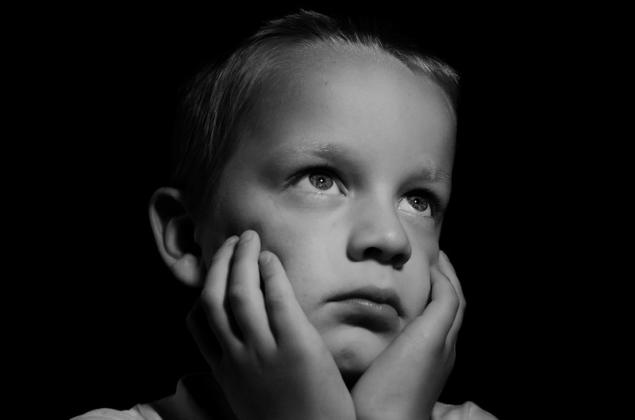
JOY.
Talk about joy. In many families, this emotion is forbidden, especially in Russia. "Laughter for no reason sign fool". "Many will laugh, many will cry." We have slogans that are just as the script is transmitted from generation to generation. You can see this family a cliche of sadness on her face. Mother's, grandmother like daughter like that. It's like a Pierrot.
Here is an example from practice. Somehow to me the advice was a woman. It is very troubling that the children do not want to communicate with her and try to run away from home. When she came, it was a feeling that "I rolled a tear." Perhaps the children apparently another scenario, they do not want to be sad?
The children are now very competent. When parents give advice, children often suggest to parents to use them. They do not inspire nor sad parents nor their "success" in life. "What right have you to tell me how to be happy, I can see that you're miserable," says the daughter to the mother. Indeed, how can we benefit other people, if you go all the time with sad faces.
Svetlana roiz: Reactions of children to parents publication about them in social networksAbout the sexual education — what and then is corrected by years ofFEAR were often banned in his childhood, especially men. "Boys never cry". In fact, the boys are also afraid. But contrary to all his senses; he should be fearless robot. Wives expect of husbands only right decisions, but sometimes the man is afraid, he also can cry.
This is normal. If a man does not trust these feelings in you, he forbids you to experience them. The man who has not felt your tears when you cry, he will fall into a stupor, he will pretend that he does not see. And it will be easier to leave home. Because in his heart will happen something strange, and it will be scary.published
Author: Marina Talakova
Source: psyfactor.org/lib/touchiness.htm
However, amnesia is not a panacea. It is much better to understand the origins, the roots of this feeling, to understand how to live it and be free from emotional baggage. That's exactly what we're gonna do. Resentment is a condition inherent to children's age, this is where it begins, and then accompanies us through life. However, resentment is a normal human emotion. In daily life this feeling is caused when events occur, unplanned by us, something unpleasant happens to us. Suddenly life goes not on that route, the plan, as we would like. We don't know how to deal with it, not ready to such turn of events, I want to defend myself from the situation, the circumstances, and as protective reaction a sense of resentment.
So, resentment is a natural reaction that periodically we live. Ie even in our spiritual practice, it is impossible to fully get rid of this feeling, another issue is that we can learn to control it, but deep down, sometimes we will be hurt, wounded. Otherwise, we should become emotionless robots.
However, there is another concept — the resentment, that is, a chronic state of resentment. What exactly you should be free, so it's resentment as the quality of the character. Resentment is a mental concept more, it is a state of mind. And this is the diagnosis, this is cause for concern.
Psychologists say that resentment is a manifestation of the child EGO-state. That is outside us can be 30 or 60, but inside we can feel like 5-year-old scared child or rebellious teen Says that each of us lives a child, regardless of our age. And this baby or happy or lonely inside of us. Sometimes he takes the decision for us, gives emotional outbursts, unpredictable behavior, and that he is able to learn easily find the most incredible creative solutions. The child in us will always continue to live, and the more it will be interesting in this world, so it will be interesting to us. Never we your inner child don't kill, thank God. We need to create comfortable conditions for its development.
But in addition to the child's inner influencing us subconsciously, must be at the level of consciousness of a Mature person who actually controls the life. Since the Mature personality after some moments, when there was a fogging of the mind emotions, to continue the conversation. A Mature personality in adulthood might say, "Excuse me, your words were for me, painful. I don't think you wanted to hurt me?!" Seemingly simple phrase.
Please tell me if you here this phrase spoken, even if you had malicious intent to hurt, what emotions does it cause? Even if we assume that you are such a demonic creature, your goal is to offend people. In life, these individuals practically do not exist. Often we offend accidentally, subconsciously, not putting before itself the purpose to offend. But if you hear such words invariably come remorse and shame. This is natural, because they think: "Oh, my God, of course not. I'm sorry, I didn't mean to offend. You do not understand me. I would like you to explain". And then you by clarifying the situation, I can understand, no offense. This is the function of an adult, it is the function of the mind. At this resolution the situation we really want to hear person.
Unfortunately, in most cases, we don't want to hear each other, we want to hear only himself and the view that somehow coincides with our. But if we want to respect the person, we are obliged to clarify the situation, even if his words cause us pain. I refer to his desire to clarify the situation — is a feature of a Mature man.
It is very important to learn to identify their feelings. And to learn this is to model "I-messages". Often we say "you-messages". We say, "You're annoying, you disturb me, you do anyway". I.e., we always start his speech with pronouns "You" and almost never say "I".
What do you mean — "I-message"? When I talk about my feelings and about his wish, starting with the pronoun "I". For example, I said, "I feel pain" or "I'm feeling as I boil wave of irritation," or "I feel now that I fear comes, I have distrust." I give a report of what I feel at this point in time. It is important to understand that we always feel something.
Another issue is that we are not taught this. At the seminar "Window to the world of the child", where I teach parents conscious parenting, I always ask parents to indicate the feelings of the child in his emotional reactions, thus we help our child to get acquainted with the world of emotions and feelings. I say that in the period when the child is small, he doesn't understand what's going on with him, he needs to tell. He needs to identify his feelings and emotions.
For example, a child stamping her feet, and we say — I see you are angry, you are not satisfied with something. I.e., we denote this, and the child understands that mom is not afraid of his behavior, the mother is not annoying. Often in life, the parents yell at the child: "hush, this moment! Otherwise the angle will put..." i.e. start to get annoyed, while completely ignoring the emotion of the child. And the child then grips your emotions. But since he is a living being, he continues to experience them. He starts to experience very strange way.
There are 4 basic emotions that a person experiences:
1. Sadness.
2. Joy.
3. Fear.
4. Anger.
I ask you to think about which of these emotions you were BANNED? Now we are going to talk about it. And we will see that we banned a natural manifestation of our feelings and emotions, the result is.

SADNESS.
Whom was forbidden the expression of sorrow in childhood? Ie when you were sad, you said, "What are you doing that face, come on, come on!" You are not allowed to be in a sad mood. Or somehow distracted, or entertained, or doing something, but the sadness was forbidden.
It is interesting that instead of forbidden emotions, comes some other emotion, the so-called racketeering in emotion. Heard the racket? So there is an emotional racket. I begin to use a different emotion, which is acceptable, which in our family is welcome.
I can say that this story is about me. We in the house were forbidden sadness. The alternative it was joy. That is, if the person has been sad in our family, it was not welcomed. Welcome joy, and this is manifested in the following way. There is a scenario of life, is called "bring joy to others."
Ie people who live in such a scenario, any company begin immediately to jest, to joke, to cheer everyone. As soon as the company, they begin to work kultmassovym entertainers. I must say that this is a great ability, but bad when you do it virtually without a choice. It is your coercive behavior, your coercive behavior to have all. You just can't allow someone sad sat. Be sure you have a sad laugh.
Among us there are people who, because of their profession are "Joker", like Mikhail Zhvanetsky. If you ask their families what they are in the home, usually they are very prone to depression. But as soon as they see the spectator as soon as I see the side view, begin to portray.
The look they remember from childhood, this look of their mom or dad. And so now, any opinion, addressed to you, it is an occasion for the manifestation of artistic abilities. For others this person is very attractive, the soul of the company. He is asked everywhere, he's funny. But still one problem, who would amuse him. Because he's really not rosy, even when she smiles.
I had one girl in respiratory therapy. Therapy deep breathing is used to cleanse the subconscious. You breathe deeply, focus on the breath, not controlling the situation, it sounds special music. Girl crying during therapy, but along with the tears she had stretched widely in a smile face. It was a grimace of laughter. This condition was the man. Surrounding will never believe that funny can be a problem.
ANGER.
If you were banned anger, often to be replaced as the racket comes fear. Such people are often quiet, taciturn, prefer to be outside, I do not like to open, etc? They are actually afraid. Because at a deep enough contact they begin to feel like "something" rising from the inside. They are afraid that this "something", I prefer to depart. Rises actually anger. And therapy these people will go through the accommodation of wrath, through the release of anger.
They had a real reason to be angry, they had every reason to be angry. And they just banned. And to prevent a person to experience the natural emotions, so to suppress them. Man is such a kind of life that can transform emotions. We can transform sadness into joy, resentment – the feeling of gratitude. A lot of opportunities gives human form of life, but only at the level of the mind.
If emotions are simply suppressed, then the person looks from the side like controlling their emotions. But really he's just scared. He is afraid to show it, live it. Fear that I'll fall into some kind of uncontrollable situation leads to the fact that we just avoid those feelings. Here again this is racketeering in emotion.

JOY.
Talk about joy. In many families, this emotion is forbidden, especially in Russia. "Laughter for no reason sign fool". "Many will laugh, many will cry." We have slogans that are just as the script is transmitted from generation to generation. You can see this family a cliche of sadness on her face. Mother's, grandmother like daughter like that. It's like a Pierrot.
Here is an example from practice. Somehow to me the advice was a woman. It is very troubling that the children do not want to communicate with her and try to run away from home. When she came, it was a feeling that "I rolled a tear." Perhaps the children apparently another scenario, they do not want to be sad?
The children are now very competent. When parents give advice, children often suggest to parents to use them. They do not inspire nor sad parents nor their "success" in life. "What right have you to tell me how to be happy, I can see that you're miserable," says the daughter to the mother. Indeed, how can we benefit other people, if you go all the time with sad faces.
Svetlana roiz: Reactions of children to parents publication about them in social networksAbout the sexual education — what and then is corrected by years ofFEAR were often banned in his childhood, especially men. "Boys never cry". In fact, the boys are also afraid. But contrary to all his senses; he should be fearless robot. Wives expect of husbands only right decisions, but sometimes the man is afraid, he also can cry.
This is normal. If a man does not trust these feelings in you, he forbids you to experience them. The man who has not felt your tears when you cry, he will fall into a stupor, he will pretend that he does not see. And it will be easier to leave home. Because in his heart will happen something strange, and it will be scary.published
Author: Marina Talakova
Source: psyfactor.org/lib/touchiness.htm








